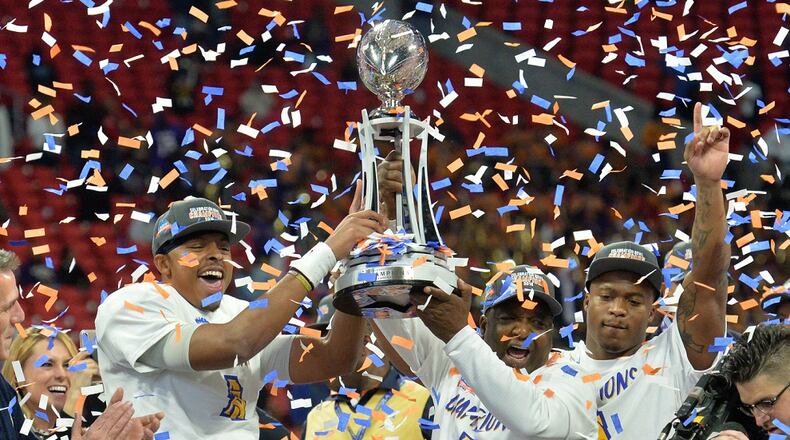The Celebration Bowl returns to Mercedes-Benz Stadium after COVID-19 led to the cancellation of last year’s game.
MEAC-champion South Carolina State (6-5) will battle SWAC-champion Jackson State (11-1) at noon Saturday in a game televised by ABC and expected to be played in front of a sellout crowd.
Much of the credit goes to Dennis Thomas, who is in his last year as MEAC commissioner.
Thomas was instrumental in the start of the Celebration Bowl, its development and what it has become. Having played at Alcorn State and coached at Alcorn State and South Carolina State, he knew HBCUs needed a bigger platform to showcase their athletes.
His idea came as he observed the Heritage Bowl, a game that was played annually at the Georgia Dome in the 1993-99 seasons (it was first played in Miami and Tallahassee).
“Over the years, it just could never sustain itself,” Thomas said about the Heritage Bowl. “We could not get a corporate partner that would believe in the vision and concept. When I became (MEAC) commissioner, I had the vision that if we could align with a corporate partner, whether it be ESPN, NBC or Fox, then we could sustain it. We would need to invite both champions of the MEAC and SWAC.”
Credit: Mark W. Sutton
Credit: Mark W. Sutton
Thomas’ vision led to the Celebration Bowl.
“When ESPN came to the table for a conference line agreement, we were discussing a preseason kickoff contest (which became the MEAC-SWAC challenge),” Thomas said. “Then I said we need a postseason bowl game.”
While Thomas managed to get a deal with ESPN, he struggled with other schools to get into agreement for the bowl game.
“At first ESPN said, let’s do it,” Thomas said. “When I told the presidents, chancellors, athletic directors and head coaches, they said, ‘We want to be a part of the FCS playoffs.’ So when they said, ‘Nahh, we want to stay in the playoffs.’ That was a very difficult point to say the least. I had to go back to ESPN and say we couldn’t do it.”
It was something Thomas knew he had to fight for and convince other schools to join him. He described his persistence.
“What happened was, every year, I would bring it back up, and they would say no,” Thomas said. “After the fifth year, they said, ‘Dennis, just don’t bring that up anymore.’ So I revised my strategy. I asked John Skipper (President, CEO of ESPN at the time) to come speak with presidents and chancellors. He came and spoke with them, and they listened. (They did not vote on it at that time.) The following spring, I brought it up again. It’s in its 10th year now, and they finally had a vote, and it was decided that we would send our football champions to the bowl game, and I worked for a decade to make this bowl game happen.”
In 2015, the Georgia Dome hosted the first Celebration Bowl. In that game, MEAC-champion North Carolina A&T defeated SWAC-champion Alcorn State 41-31. Notably, Aggies running back Tarik Cohen (now with the Chicago Bears) won the offensive MVP. Linebacker Denzel Jones won defensive MVP.
But it was Cohen’s response in a postgame interview that made Thomas smile and grateful for pulling off the Celebration Bowl.
“My favorite memory is the postgame press conference when the student-athletes were being interviewed and one of the reporters asked, ‘How was the bowl experience,’” Thomas said. “Cohen said, ‘It’s outstanding. They treated us like kings.’ That what was a part of the vision, to give the student-athlete a bowl experience on a national platform, national stage.”
Along with the growth of the Celebration Bowl, Thomas believes HBCU sports have grown and taken strides this season. He credits ESPN and their decision to invest in them.
“ESPN deserves huge kudos because they’ve invested their resources in the HBCU athletic program,” Thomas said. “I remember as a head coach in the mid ‘80s, South Carolina State would play Grambling on Thursday night on ESPN. ESPN had the foresight that there was value in the MEAC and SWAC and that they needed to invest.”
This year Falcons legend Deion Sanders is bringing his Jackson State team to the school’s first Celebration Bowl appearance. Thomas applauds Sanders and what he has done.
“I commend him and anyone that goes into an institution and makes it better,” Thomas said. “He has done a commendable job and he’s taken advantage of his national notoriety as ‘Prime Time’ to enhance his program.”
Thomas also credits other coaches and former NFL players who returned to coach at HBCUs, such at Ken Riley at Florida A&M and Larry Little at North Carolina Central and Bethune-Cookman.
“We have had former NFL coaches to come coach, specifically in the MEAC for a long time,” Thomas said. “... Not a lot of people are aware of our history of having former NFL players as head coaches at our HBCU institutions.”
Thomas is glad he never gave up on his vision and wants the Celebration Bowl to continue growing.
“With all great visions, there are difficulties, and you have to persevere,” Thomas said. “You can’t give up on the vision. I think moving forward, the Celebration Bowl, executive director John Grant, will do well. I believe either you’re getting better or getting worse, no in-between.”
About the Author
The Latest
Featured



